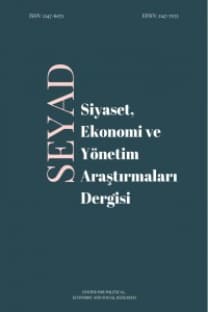İnsani Gelişme ve Ekonomik Büyüme İlişkisi: Türkiye Üzerine Ampirik Bir Çalışma
Ekonomik Büyüme, İnsani Gelişme, Bootstrap Nedensellik, Ekonomik Büyüme, İnsani Gelişme, Bootstrap Nedensellik, Economic Growth, Human Development, Bootstrap Causality
Relationship Between Human Development and Economic Growth: An Empirical Study on Turkey
Economic Growth, Human Development, Bootstrap Causality, Economic Growth, Human Development, Bootstrap Causality,
___
- Anand, S., ve Sen, A. (2000). Human development and economic sustainability. World development, 28(12), 2029-2049. Bundala, N. (2012). Economic growth and human development; a link mechanism: an empirical approach. Dikmen, M. K. (2004). Ḃ üyüme ve insani gelişme arasındaki bağlantılar uluslar arası amprik bir çalışma. Iktisat Isletme ve Finans, 19(222), 39-54. Erdem, E., ve Çelik, B. (2019). İnsani gelişme ve ekonomik büyüme ilişkisi: bazı Afrika ülkeleri üzerine bir uygulama. Bingöl Üniversitesi Sosyal Bilimler Enstitüsü Dergisi, 9(17), 1336. Gürses, D. (2009). 'İnsani gelişme ve Türkiye. Balikesir University Journal of Social Sciences Institute, 12(21). Hacker, R. S., ve Hatemi-J, A. (2006). Tests for causality between integrated variables using asymptotic and bootstrap distributions: theory and application. Applied Economics, 38(13), 1489-1500. Human Development Report (2016), United Nations Development Programme, New York, http://hdr.undp.org/en/2016-report (Erişim Tarihi: 25.07.2019). Kaya, A. (2017). Finansal piyasalardaki gelişmelerin insani gelişmişlik üzerine etkisi: Türkiye örneği. Uluslararası İktisadi ve İdari İncelemeler Dergisi, 20, 169-180. Pesaran, M. H., Shin, Y., & Smith, R. J. (2001). Bounds testing approaches to the analysis of level relationships. Journal of applied econometrics, 16(3), 289-326. Ranis, G. (2004). Human development and economic growth. Yale University Economic Growth Center Discussion Paper, (887). Ranis, G., Stewart, F., & Ramirez, A. (2000). Economic growth and human development. World development, 28(2), 197-219. Shahbaz, M., Iqbal, A., & Butt, M. S. (2011). Testing causality between human development and economic growth: a panel data approach. International Journal of Education Economics and Development, 2(1), 90-102. Sharifi-Renani, H., Mirfatah, M., ve Honarvar, N. (2012). Effects of human development ındexes (hdıs) on economic growth in mena countries: an emphasis on education and literacy ındexes. Available at SSRN 2103360. Şahin, G., ve Gökdemir, L. (2016). İnsani gelişme endeksi bileşenlerinin Türkiye ölçeğinde ardl sınır testi ile sınanması. Gazi İktisat ve İşletme Dergisi, 2(1), 1-24. Şaşmaz, M. Ü., ve Yayla, Y. E. (2018). Vergiler ve ekonomik büyüme ile insani gelişme arasındaki nedensellik ilişkisi: avrupa birliği geçiş ekonomileri örneği. Journal of Turkish Court of Accounts/Sayistay Dergisi, (111). Tekin, B., ve Gör, Y. (2019). Finansal gelişmişlik ile insani gelişmişlik arasındaki eşbütünleşme ve nedensellik ilişkileri. Uluslararası İktisadi ve İdari İncelemeler Dergisi, 1-16. Toda, H. Y., ve Yamamoto, T. (1995). Statistical inference in vector autoregressions with possibly integrated processes. Journal of econometrics, 66(1-2), 225-250. UNDP (1990), Human development report 1990. New York: Oxford University. United Nations Development Programme. (2018). Human development indices and indicators: 2018 statistical update. Ünal, Ç. (2008). İnsani gelişmişlik endeksine göre Türkiye’nin bölgesel farklılıkları, Coğrafi Bilimler Dergisi, 6(2), 89-113. Yildirim, E., ve Kesikoglu, F. (2012). Ithalat-Ihracat-Döviz Kuru Bagimliligi: Bootstrap ile Düzeltilmis Nedensellik Testi Uygulamasi. Ege Akademik Bakis, 12(2), 137.
- ISSN: 2147-6071
- Yayın Aralığı: Yılda 2 Sayı
- Başlangıç: 2014
- Yayıncı: Politik Ekonomik ve Sosyal Araştırmalar Merkezi
Dijital Ekonominin Getirdiği Vergilendirme Sorunlarının Değerlendirilmesi: Kurumlar Vergisi
Denizyolu Düzenli Hat Taşımacılığında Hız Düşürme Pratiği İncelemesi
Türkiye’de Yerel Harcamaların ve Yerel Vergi Gelirlerinin İller Düzeyinde Analizi
19. YY.’dan Günümüze Almanya’da Belediye Maliyesinin Gelişimi
İnsani Gelişme ve Ekonomik Büyüme İlişkisi: Türkiye Üzerine Ampirik Bir Çalışma
